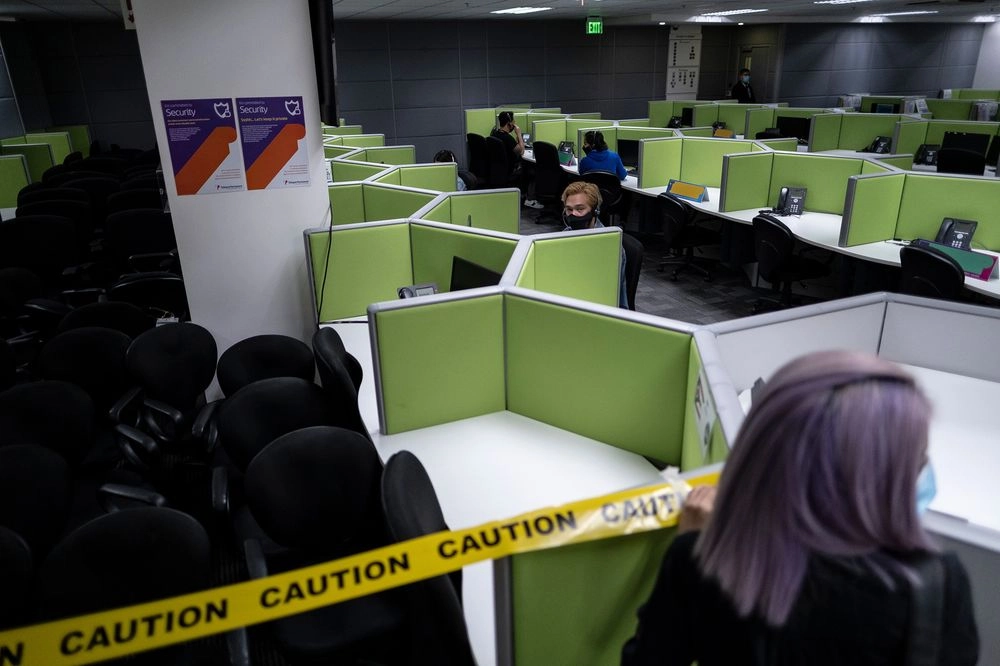We just came out of one of the best economies in history, but we now face a recession brought on by the COVID-19 pandemic crisis.
Even if there were a V-shaped curve to the recovery, it would not change a looming huge factor going forward:
cost reduction is more important than ever before.
Although lower cost was not the significant driver in creating value in the digital world, COVID-19 adds a new wrinkle to transformation because it exposed the underlying support for business processes.
It set the stage for what is now an overwhelming impetus for companies to take on the risks of changing the way they do business.
Call center work is a good example of this phenomenon.

Before the COVID-19 crisis, a significant number of companies had a work-from-home component in their call centers, but they viewed it as supplemental to their core call center strategy.
WFH (work-from-home model) started emerging as a viable operation back in 2007. Companies used it to enable work from handicapped people who could not leave home to participate in the workforce.
It was a sort of a novelty for companies, and they were cautious about using it. They especially liked the ability to provide employment for injured veterans as customer service reps.
This work model then started to take hold in other areas such as translation services for police departments or healthcare businesses. This was an attractive strategy, as it allowed companies to access talented people proficient in various languages.
It was definitely much more difficult to find such a talented labor pool in concentration before.
During those years, companies perfected the technology, processes and approaches for robust platforms as well as how to deploy them at scale. Still, until recently, it was difficult for third-party service providers to get clients to see the platforms as viable.
Fast forward to the past few months when the COVID-19 pandemic forced businesses to shut down and shift most of their employees to work from home.
This virus crisis became a sort of incubator for moving work in mass to homes.
As a result, it changed the perception of what kind of work people can do from home. It also changed the perception of the quality of work performed at home.
Many companies found that a robust work-from-home platform enabled work at equal or even better quality than work traditionally conducted in the office. Now they look at how to extend this model post-pandemic or even permanently.
This is especially true of call center and customer service work.
The success of employees working from home during the COVID-19 crisis is a revelation for service providers and their clients.
Going forward, I believe most third-party services will include a WFH component and incorporate it into their Master Service Agreements (MSAs).
Work-from-home model benefits

As companies rethink the viability of permanently shifting most call center and customer service processes (or at least a large component of them) to the work-from-home model, they recognize that they now have an over-investment in call center facilities.
Reducing their real estate footprint is another cost-reduction strategy.
Moreover, as I recently discussed in my blog, the
COVID-19 crisis proves that automation matters.
Rethinking the processes also lays out a clear path for a significant investment in building out the call center platform.
This path includes leveraging robots in call center functions. It may seem contradictory to invest in technologies for competitive positioning when companies have a recession mindset of saving money. But as I previously blogged, it is necessary to take
actions for the short term and the long term at the same time.
Here is what the COVID-19 crisis showed executives about company operations from home:
· Once they master the platform technology and approaches, it provides a different way to engage a workforce.
· Robust work-from-home platforms enable reconceiving how people work.
· This model affords companies a level of flexibility they only dreamed of before experiencing it at scale because of COVID-19.
The success of the work-from-home model during the COVID-19 crisis also leads companies to reimagine how processes other than call centers and customer support services could benefit from incorporating the work-from-home model.
I believe a far more dynamic and flexible set of working environments will evolve from the crisis. Thus, companies will follow the advice of former White House Chief of Staff Rahm Emanuel:
“You never want a serious crisis to go to waste. And what I mean by that is an opportunity to do things that you think you could not do before.”
Source: https://www.forbes.com/sites/peterbendorsamuel/2020/07/22/call-centers-show-bright-spot-in-covid-19-crisis/?sh=153f10bb2162

 As companies rethink the viability of permanently shifting most call center and customer service processes (or at least a large component of them) to the work-from-home model, they recognize that they now have an over-investment in call center facilities.
Reducing their real estate footprint is another cost-reduction strategy.
Moreover, as I recently discussed in my blog, the COVID-19 crisis proves that automation matters.
Rethinking the processes also lays out a clear path for a significant investment in building out the call center platform.
This path includes leveraging robots in call center functions. It may seem contradictory to invest in technologies for competitive positioning when companies have a recession mindset of saving money. But as I previously blogged, it is necessary to take actions for the short term and the long term at the same time.
As companies rethink the viability of permanently shifting most call center and customer service processes (or at least a large component of them) to the work-from-home model, they recognize that they now have an over-investment in call center facilities.
Reducing their real estate footprint is another cost-reduction strategy.
Moreover, as I recently discussed in my blog, the COVID-19 crisis proves that automation matters.
Rethinking the processes also lays out a clear path for a significant investment in building out the call center platform.
This path includes leveraging robots in call center functions. It may seem contradictory to invest in technologies for competitive positioning when companies have a recession mindset of saving money. But as I previously blogged, it is necessary to take actions for the short term and the long term at the same time.



